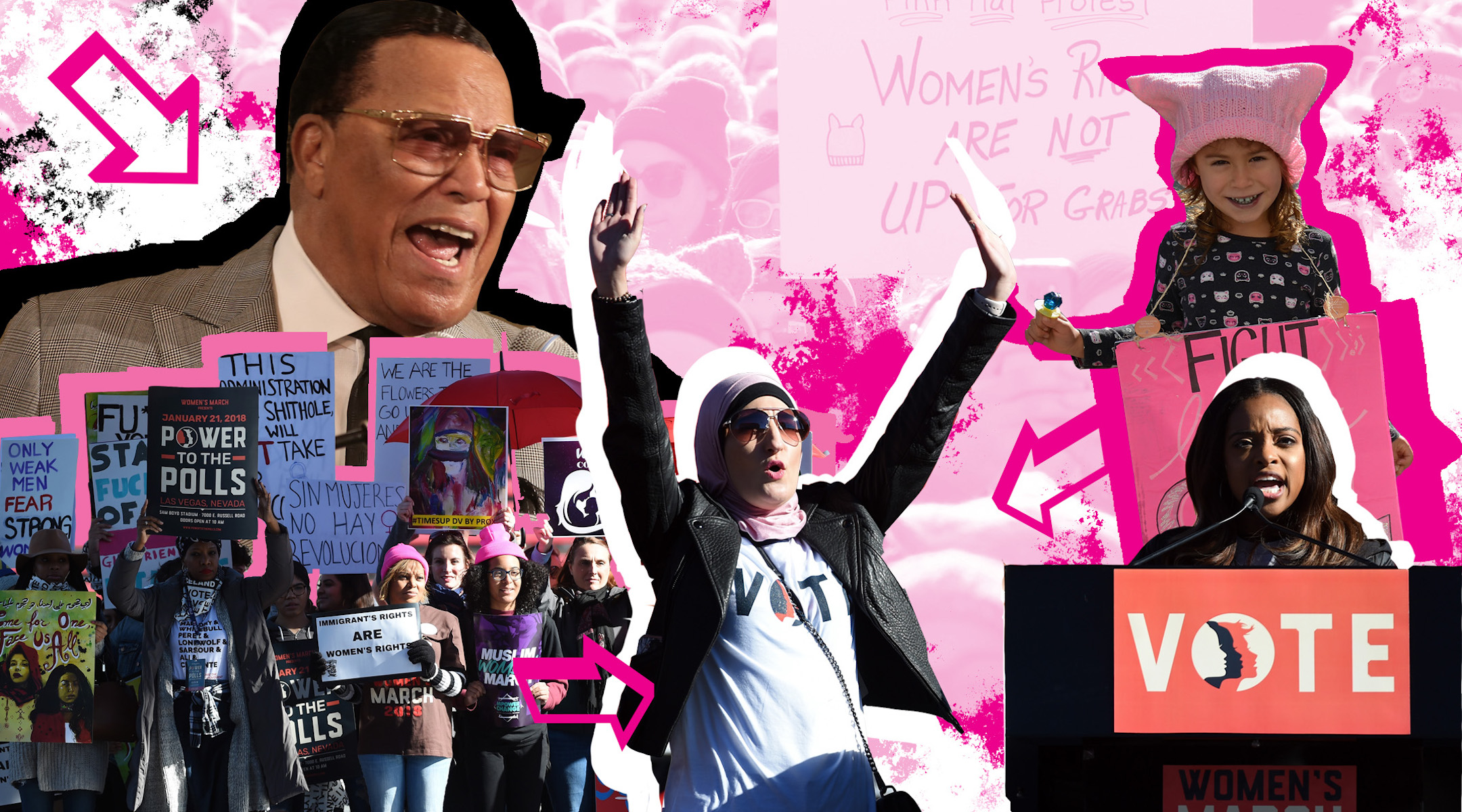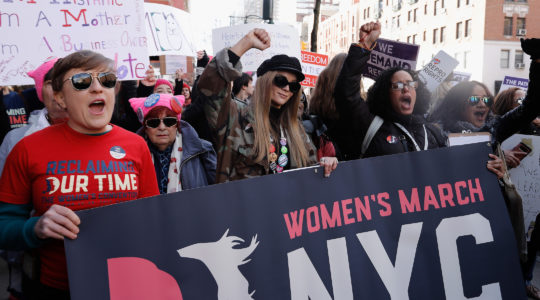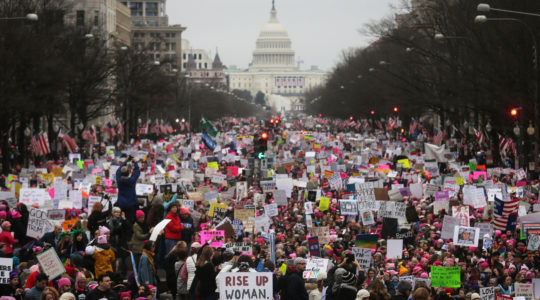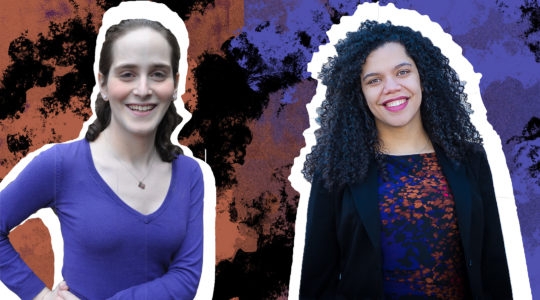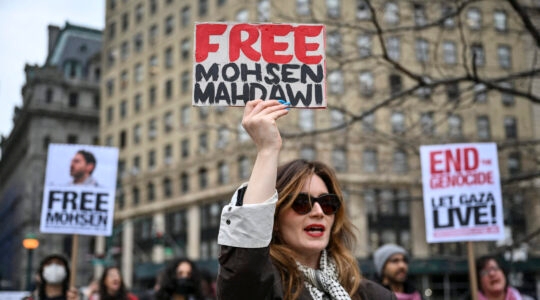NEW YORK (JTA) — With the Women’s March only days away, local chapters and major progressive groups are continuing to distance themselves from the national leadership, which is scrambling to hold on to its big tent.
Though the national organization was once seen as a beacon of hope for progressives following Donald Trump’s election, it is now mired in allegations that its leaders have not only been too soft on but in some cases fostered anti-Semitism in the movement. The fact that the march was created as a protest not only against sexism but other forms of bigotry makes the allegations even more disturbing.
Where did things go wrong?
The accusations date back to organizer Tamika Mallory’s ties to Nation of Islam leader Louis Farrakhan, who has a long history of making anti-Semitic comments. More recently, an article in Tablet alleged that Mallory and fellow organizer Carmen Perez made anti-Jewish comments at planning meetings. Throughout it, the Women’s March organizers — along with Mallory and Perez they include Palestinian-American activist Linda Sarsour and fashion designer and activist Bob Bland — have released various statements on the controversy. Some have been conciliatory, others have only inflamed the tension.
JTA looked back at the anti-Semitism allegations made against the march and how leaders responded.
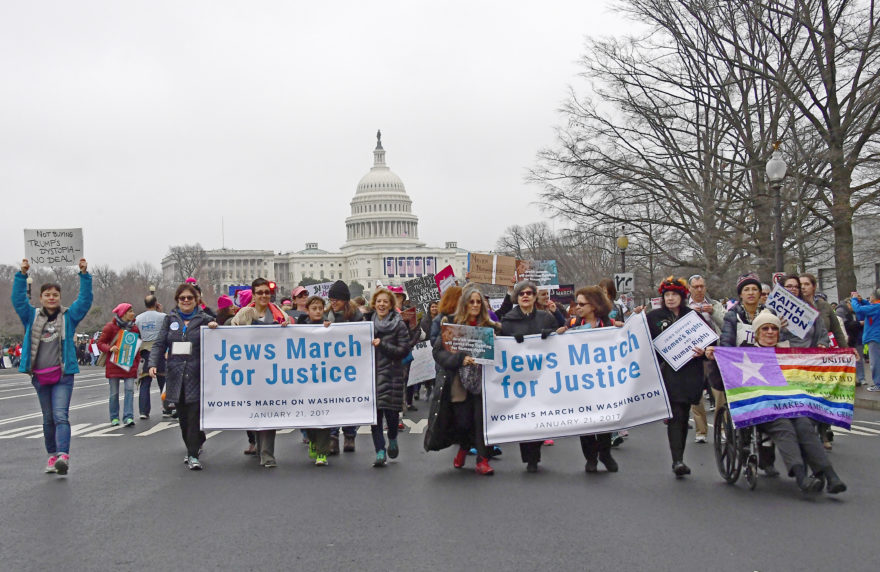
Supporters of National Council of Jewish Women and other Jewish organizations come together on the National Mall for the Women’s March on Washington, Jan. 21, 2017. (Ron Sachs)
January 2017
- On Jan. 21, millions of women marched around the world — many wearing wool “pussy hats” to protest Trump’s past lewd remarks about sexual assault — in support of a range of issues, including gender equality, LGBTQ rights and racial justice. The day offered a searing rebuke to Trump’s rhetoric and seemed to be a galvanizing moment for the anti-Trump left, uniting women (and many men) across racial, socioeconomic and geographic divisions. It was the biggest one-day protest in U.S. history.
February 2018
- On Feb. 25, Mallory attends the Nation of Islam Saviours’ Day event, where leader Louis Farrakhan says that “powerful Jews are my enemy” and refers to “the Satanic Jew,” among other anti-Semitic and anti-LGBTQ statements. From the stage, Farrakhan gives a shout-out to Mallory, who posts admiring photos from the event on Instagram. The Anti-Defamation League and CNN anchor Jake Tapper point out Mallory’s attendance at the event, spurring calls for her to disavow Farrakhan.
March 2018
- It takes over a week for the Women’s March to release a statement, and the organization is criticized for doing too little, too late. “Minister Farrakhan’s statements about Jewish, queer, and trans people are not aligned with the Women’s March Unity Principles,” the statement reads. But the organizers do not fully disavow Farrakhan or criticize Mallory for attending his speech. “We love and value our sister and co-President Tamika Mallory,” the March 6 statement reads.
- Mallory, who is African-American, further defends her ties to Farrakhan in a piece for NewsOne published a day later. “Where my people are is where I must also be. I go into difficult spaces,” she writes.
April 2018
- Mallory slams Starbucks for enlisting the Anti-Defamation League as an adviser in a racial-bias education session for its staff. In an April 17 tweet, she accuses the Jewish group of “constantly attacking black and brown people.” The coffee giant later announces that the Jewish anti-bigotry group would no longer play a leading role in diversity training.
October 2018
- The anti-Semitism issue returns to the spotlight again when actress and activist Alyssa Milano calls out the organizers of Women’s March Inc. for the anti-Semitism allegations in an interview with the Advocate published on Oct. 30, three days after the deadly shooting at Pittsburgh’s Tree of Life synagogue. Milano, who spoke at the march in 2017, says she would not speak at the event again if Sarsour and Mallory are in charge. Her comments are especially significant because it was her tweet urging women to share their experiences of sexual harassment and assault that helped propel the #MeToo movement into the mainstream. (Activist Tarana Burke had coined the term in 2006.)
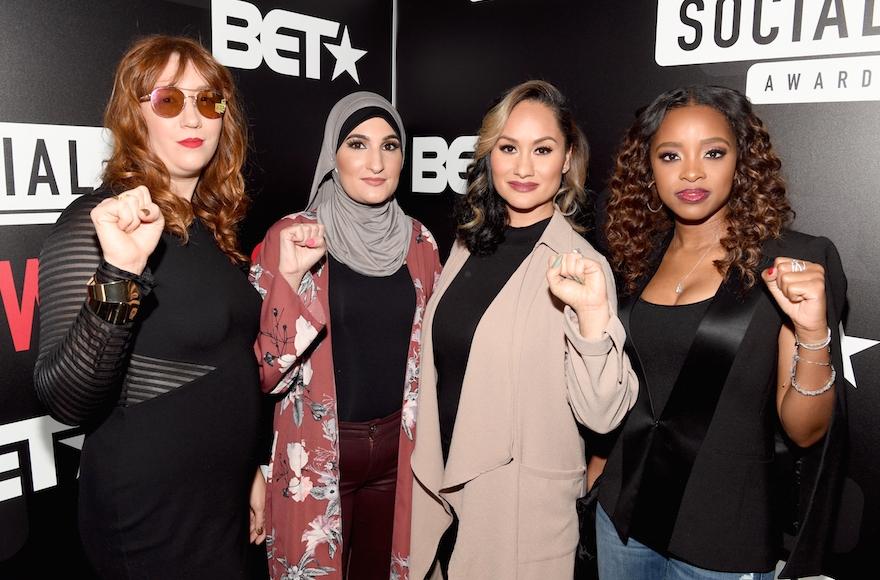
The organizers of the Women’s March, from left to right, Bob Bland, Linda Sarsour, Carmen Perez and Tamika Mallory, at BET’s Social Awards in Atlanta, Feb. 11, 2018. (Paras Griffin/Getty Images for BET)
November 2018
- On Nov. 8, the Women’s March releases another statement in which it disavows Farrakhan’s anti-Semitic statements but throws its support behind Mallory and Sarsour. “We all know the real cause of violence and oppression of our communities,” the statement reads. “This is well-documented and inspired by vile rhetoric coming from the Trump administration and from members of the Republican Party.” A day later, actress Debra Messing tweets her support for Milano’s stance.
- In a Nov. 15 Facebook post, Sarsour defends newly elected Rep. Ilhan Omar, a Minnesota Democrat, who was criticized after she expressed support for boycotting Israel. Sarsour writes that the attacks against Omar, a Somali American, are “not only coming from the right-wing but some folks who masquerade as progressives but always choose their allegiance to Israel over their commitment to democracy and free speech.” The American Jewish Committee says Sarsour is relying on anti-Semitic dual loyalty tropes.
- On Nov. 18, Sarsour releases a long statement saying that critics accused her of being anti-Semitic prior to the Farrakhan drama and that the accusations are because she is “a bold, outspoken BDS supporting Palestinian Muslim American woman.” She also says that Mallory’s family had a longstanding relationship with the Nation of Islam “after the brutal murder of her son’s father 17 years ago and the positive role NOI played in this Black single teen mother’s life.”
- The following day Teresa Shook, a co-founder of the Women’s March, releases a statement calling on the national organizers to resign. “In opposition to our Unity Principles, they have allowed anti-Semitism, anti-LBGTQIA sentiment and hateful, racist rhetoric to become a part of the platform by their refusal to separate themselves from groups that espouse these racist, hateful beliefs,” Shook writes.
- On Nov. 20, the Women’s March releases its third statement, from Sarsour, addressing anti-Semitism, which takes a more conciliatory tone. “We should have been faster and clearer in helping people understand our values and our commitment to fighting anti-semitism. We regret that,” the statement reads.
December 2018
- Tablet publishes an article on Dec. 10 citing participants who allege that Mallory and Perez made anti-Semitic comments at Women’s March planning meetings. The organizers deny making such statements, but the allegations quickly spread on social media and in various news outlets. Local Women’s March chapters tell JTA that the latest controversy combined with the Farrakhan debate, are hurting their image. The Jewish Democratic Council of America calls for the national Women’s March organizers to step down.
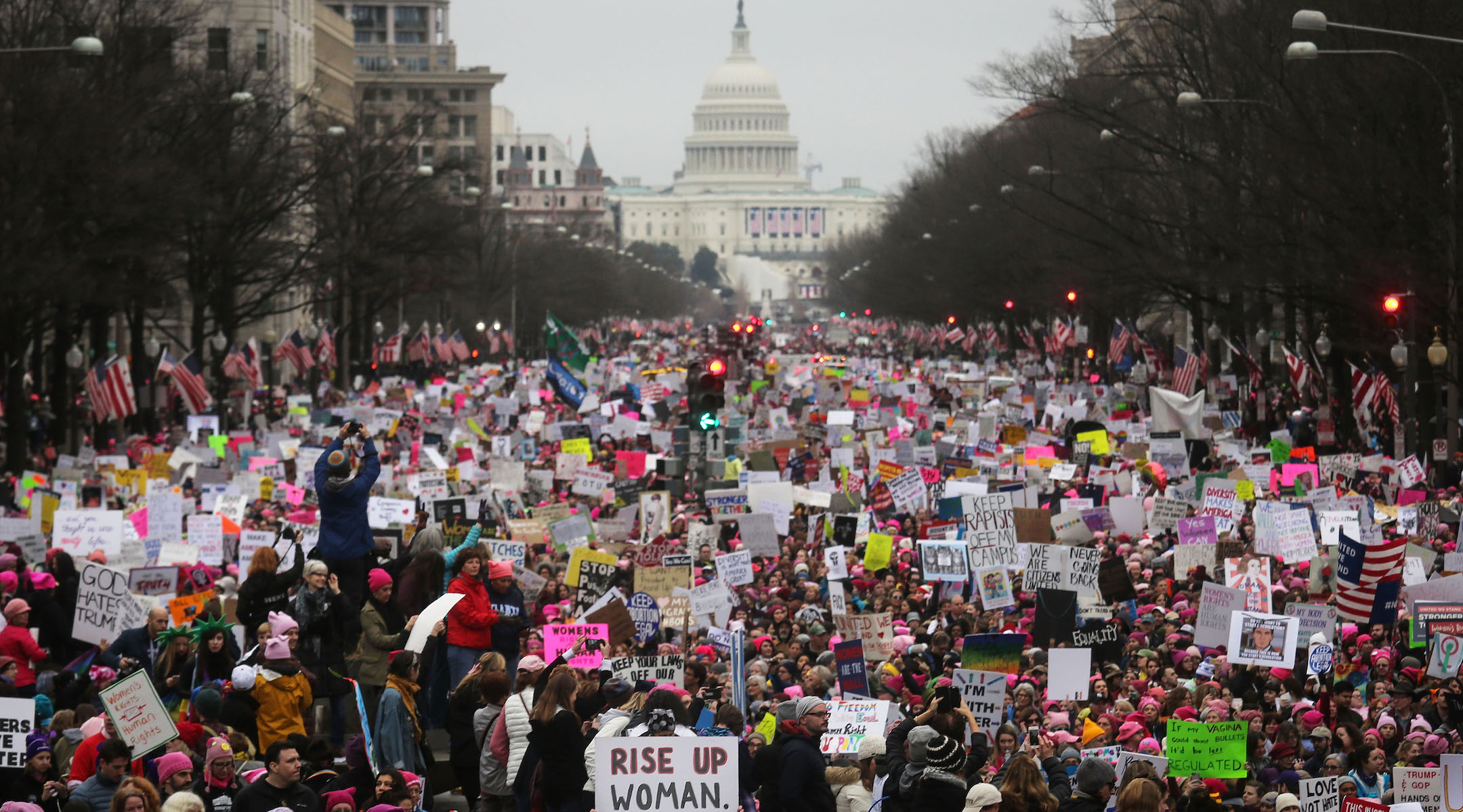
Protesters walk during the Women’s March on Washington, Jan. 21, 2017. (Mario Tama/Getty Images)
January 2019
- On Jan. 14, the Women’s March names its new 32-member steering committee, which includes three Jewish women: transgender rights activist Abby Stein; Union for Reform Judaism staffer April Baskin; and Jewish diversity activist Yavilah McCoy.
- That same day, Mallory and Bland appear on “The View,” where co-host Meghan McCain confronts them about the anti-Semitism allegations. Though Bland condemns Farrakhan’s anti-Semitism, Mallory refuses to follow suit. “[I]t’s not my language, it’s not the way that I speak,” she says.
- As the march date approaches, media outlets report that a range of groups are no longer affiliated with the rally. Among them are the National Council of Jewish Women, the Jewish Women’s Foundation of New York, the Southern Poverty Law Center and Emily’s List. The Democratic National Council also decides not to sponsor the march, according to the Jewish Democratic Council of America.
- On Jan. 15, Perez pens an article in the Forward apologizing for the organization’s response to the anti-Semitism allegations and urging Jewish women to join the march. “I want to be unequivocal in affirming that the organization failed to act rapid enough to condemn the egregious and hateful statements made by a figure who is not associated with the Women’s March in any way,” Perez writes. “This failure caused deep hurt and pain, especially because our movement is dedicated to centering inclusiveness.”
- Also that day, nine liberal New York rabbis endorse the Women’s March in a letter that says they had met with Sarsour and Mallory and shared their concerns about anti-Semitism. Though the letter acknowledges that differences remain, it encourages members of the Jewish community to attend the march on Saturday.
JTA has documented Jewish history in real-time for over a century. Keep our journalism strong by joining us in supporting independent, award-winning reporting.
